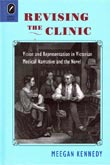 Meegan Kennedy was still taking in the news that she had been awarded tenure and a promotion to associate professor—delivered in a letter that she had just finished reading—when she sat and talked in her office about her other recent significant career accomplishment, the Jan. 2010 publication of her first book, Revising the Clinic: Vision and Representation in Victorian Medical Narrative and the Novel (Ohio State UP). "It's a wonderful feeling to see my argument in print, and to know that my research can now be useful to other scholars instead of just sitting in notes in my files," she says. Combining her study of the novel and of medical narratives; relying on hundreds of primary sources; building on current scholarship on the Victorian novel and medicine, Kennedy focuses on the similar ways Victorian novelists and physicians debate methods of "seeing and stating"—on how to observe the world and how to record those observations.
Meegan Kennedy was still taking in the news that she had been awarded tenure and a promotion to associate professor—delivered in a letter that she had just finished reading—when she sat and talked in her office about her other recent significant career accomplishment, the Jan. 2010 publication of her first book, Revising the Clinic: Vision and Representation in Victorian Medical Narrative and the Novel (Ohio State UP). "It's a wonderful feeling to see my argument in print, and to know that my research can now be useful to other scholars instead of just sitting in notes in my files," she says. Combining her study of the novel and of medical narratives; relying on hundreds of primary sources; building on current scholarship on the Victorian novel and medicine, Kennedy focuses on the similar ways Victorian novelists and physicians debate methods of "seeing and stating"—on how to observe the world and how to record those observations.
"There has been a fair amount of work done on medical discourse in the Victorian novel, looking at how medical writing gets taken up by novels when novelists write about sickness," she says. "But what I wanted to bring attention to is, first of all, how novels explore a philosophy of seeing—actually a succession of different kinds of philosophies of seeing. Second, the novel uses some of these medical techniques and strategies, not always to write about sick characters, but in all kinds of situations."
Kennedy explains that Victorian novelists borrowed different kinds of "authoritative discourse" from medical writing, and in turn, doctors were borrowing ideas about how narratives work from novelists.
 "As medical writing develops throughout the nineteenth century," Kennedy says, "you can see the form becoming more professionalized, and at the same time, you can see where medical writers are drawing on sensation fiction, on the sentimental novel, on techniques that were used to great effect in the novels that were part of the culture. Doctors and novelists were even publishing in some of the same periodicals—not specialized research—but still, they were reading and writing on the same page."
"As medical writing develops throughout the nineteenth century," Kennedy says, "you can see the form becoming more professionalized, and at the same time, you can see where medical writers are drawing on sensation fiction, on the sentimental novel, on techniques that were used to great effect in the novels that were part of the culture. Doctors and novelists were even publishing in some of the same periodicals—not specialized research—but still, they were reading and writing on the same page."
Building on other scholars' work on "mechanical objectivity," Kennedy examined what she calls "mechanical observation. It was thought that in order to see properly and morally, you had to sort of make yourself into a machine, make yourself into an automaton, so that you were just mechanically recording everything that comes under your purview," she says. "You get very similar rhetoric in realist novels in the nineteenth century, George Eliot in particular, this notion that 'I'm just going to as faithfully as I can, give my word, that this is what I am observing.' But Eliot also argues that this so-called faithful vision creates a bridge of sympathy between observer and observed—she really turns the scientific theory on its head."
"Hypothesis became more important to scientists, however, acknowledging an inherent framing of the image. Scientists during the later parts of the nineteenth century were beginning to acknowledge that imagination was a necessary tool. People like John Tyndall and George Henry Lewes were saying that not only do we need to have mechanical observation but we also need to have an imaginative insight," she says, "and if you put them together you get the fullest understanding of the way nature really works. Something similar happens in the realist novel where there is an increased willingness to foreground that kind of speculative insight."
Kennedy enjoyed her first venture into book publishing, although the editing process forced her to cut her final manuscript by about a third. In the end, the instruction to trim her word count gave Kennedy the opportunity to "make sure each sentence was both well-crafted and really necessary. It's gratifying that both readers' reports praised the craftsmanship of the prose as a result. Craft is important to me as a writer and reader, one of the reasons I love working with creative writers and rhetoric/composition students as well as literature students in my classes."
Kennedy's next project is a cultural history of the Victorian microscope, with a focus on how the Victorians wrote about the microscope as a marvel. And the satisfaction of seeing Revising the Clinic in print will be a motivating factor in accelerating her research and writing. "To be honest, it makes me want to get my new book finished and out the door too."
